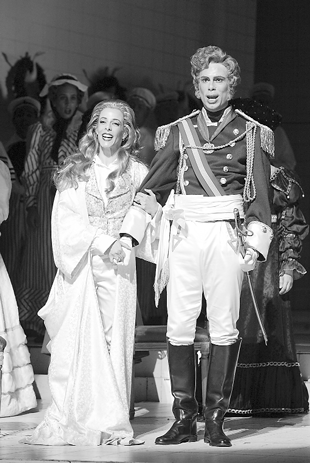Manhattan’s opera season begins with Rossini’s “Viaggio,” Massenet’s “Manon”
City Opera may have revived “Il Viaggio a Reims” (September 22) after their “Ermione” won such acclaim, but though “Viaggio” proved a pleasant diversion, Rossini’s, essentially plotless pièce d’occasion demands the greatest virtuosos in the world, not promising youngsters. The best of those on view here—dashing-voiced tenor Javier Abreu; lovely Maria Kanyova, looking like Julianne Moore and showing a fine upper extension; debuting, rich-voiced mezzo Allyson McHardy; and genuine bel canto star Daniel Mobbs—would do splendidly in “Le comte Ory,” a spiffy Rossini comedy New York City Opera would do well to restore to its repertory. Otherwise, tenor Andrew Drost showed an impressive high C and D, but less secure Italian; rising young mezzo Leah Wool made her debut, with little to sing. George Manahan led capably, but the whole exercise, while easy to take, lacked in bravura.
The Met’s “Manon” revival (September 27) was quietly pleasing, though the Ponnelle production doesn’t exactly scintillate. Most of the sets are aptly picturesque, though Act Five’s must be the worst in the house’s repertory, looking like the fire exit to the Jonathan Miller “Pelléas” cellar. Judging by audience response, Met patrons have forgotten the riches of Massenet’s score and were thrilled to hear them, awarding the fine-voiced but dramatically generic, stylistically gauche Marcelo Alvarez with unearned ovations after both his arias; the arias themselves merited the bravos. Alvarez might start his Gallic coaching with getting the word “je” right. (Hint—it does not rhyme with “feh.”) Renée Fleming by and large approached the part as an artist—not as a superstar performing her own pseudo jazz stylings—and was more probing and thoughtful with the text than has sometimes been her wont. I could have done with more animation and sharper articulation in the “Cours-la-Reine” aria, which threatened to become a droopy vocalizing at times, and the pathos of Act Five eluded her—again, that awful set might have defeated even Sayao or Bori. Fleming, in good current form, may not merit the shrieks of “as seen on TV” approval some fans bestowed after each aria and act, but hers is a beautiful instrument, and her Manon proved well worth seeing.
It was salutary to have authentic French emanating from the debonair Jean-Luc Chaignaud (Lescaut) and from the reliably droll Jean-Paul Fourchécourt (Guillot). The other semi-leads were also very well cast with the dignified Julien Robbins (Comte des Grieux) and William Shimell (Brétigny, for once an elegant man of the world). Conductor Jesús López-Cobos did yeoman work without imbuing quite enough charm.
The next night, Lincoln Center’s Great Performances got off to a tremendous start, with a near-capacity Avery Fisher Hall crowd leaping to its feet for an earned standing ovation after Sir Colin Davis’ traversal of the Verdi “Requiem” with the London Symphony Orchestra. The “Requiem” is such a flat-out wonderful piece of music that it’s hard to believe musicians don’t thrill to it as much as audiences, and here the strings soared and the tricky brass parts blazed out with fervor. The only mild disappointment was the slightly too well behaved drum—the great poundings in the repeated “Dies irae” section lacked the needed elemental heft. I have always been rather lukewarm to Davis’ recorded essays at Verdi—the starrily cast “Ballo” and “Trovatore” on Philips register as “correct,” not much more—but here, the 78-year old conductor was willing to ratchet up toward white heat, even a kind of brassy flashiness in the “Sanctus” that seemed—welcomely—most indecorous. The huge LSO chorus performed thrillingly at every dynamic level.
The quartet of soloists in this piece never seem perfectly balanced—even in the extensive recorded “Requiem” legacy, it may be only the live Karajan set with Leontyne Price, Fiorenza Cossotto, the young Luciano Pavarotti, and Nicolai Ghaiurov that shows four full peers. On paper, the LSO quartet had seemed as quirky as those listed for the other major New York “Requiem” performances expected this season. But in practice, all four singers proved enjoyable and brought at least some strength to their testing assignments.
Anne Schwanewilms proved quite sensationally good in the soprano part, singing with an ease, accuracy, and purity one rarely encounters in this music. Her spun high notes had the crowd holding its collective breath, and if she lacked Italianate breadth for filling out the bottom forte passages, she handled everything musically and with feeling. It would be nice to hear her as Arabella and Eva while her voice retains its lovely sheen.
Hungarian mezzo Idlíko Komlasí, set for the Met in “Forza” this season, showed an interesting, “complicated” timbre, the opposite of Schwanewilms in that she deployed a heavy vibrato and used pressure for musical accent—somewhat in the manner of Beverly Wolff. This made for drama, but for a less than good blend of voices in the “Agnus Dei.” Stuart Neill, whose awkwardness onstage has led him to specialize in concert work, has little poetry of phrasing, but the essential brazen quality of his tenor suits this piece and he began the solo portion excitingly; he also found softer tones for floating the “Hostias.” 29-year-old Bulgarian bass Orlin Anastassov, making a New York debut, showed a fine voice and considerable artistry—nice soft attacks—if a less than Ghiaurov-sized instrument and somewhat Slavonic Latin.
David Shengold (shengold@yahoo.com) writes about opera for many venues.
gaycitynews.com



































